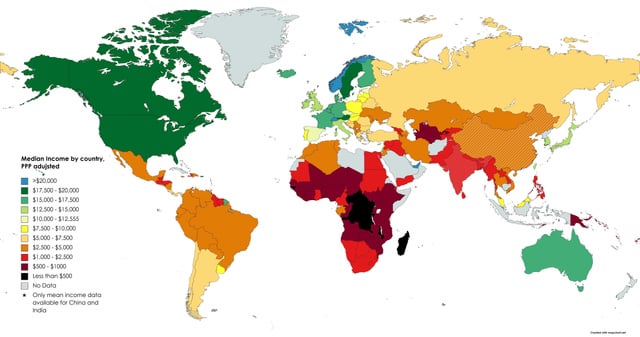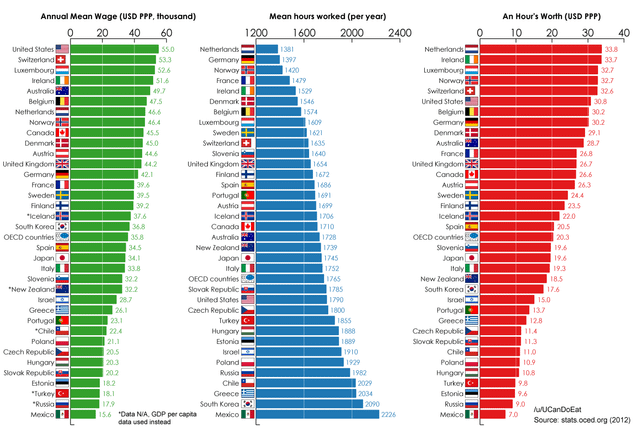edit : didn’t mentioned that the interest i saw with the graph above was that it’s usually considered cheaper to work in China, and that developing countries need to ‘be competitive’/‘lower their salaries’ in order to attract investments. This graph points out to the existence of other factors than wages in order to ‘be competitive’/‘attract investments’. Perhaps that a country should( somehow) become wealthy enough to enable its own capitalists to invest in machinery, leading to ‘higher salaries’/‘more (productive )investments’/‘higher competitiveness’, i.d.k. Still don’t know as well how China escaped the trap that every other country fell in.
Didn’t adjust for ppp. But even adjusted, rip Mexico.
Didn’t adjust for ppp.
Good point, and possibly not taxes as well. Here’s what i found for the median salary adjusted for p.p.p. :

Since the estimation of the purchasing power takes into account the cost of living, i don’t think that i’ve truly realized until now how much it’s beneficial to work in the west, everyone know that western salaries are higher, but we somehow assume that it’s compensated by the price of living, unseeing the obvious injustice here(, the kind of inequality we wouldn’t understand/tolerate for two workers living in the same street). That’s neo-colonialism(, if it was the success of capitalism, as we often hear, and we’re just jealous of the west, then it’s manifestedly not enough for countries from the global South to have been capitalist for many decades).
And it’s amplified by the fact that the gap, being even higher not adjusted by p.p.p., enables our capitalists to pay less for their (non-)human ressources.
Africa is a whole continent, yet don’t have a single successful multinational like Samsung, or Huawei, or Nintendo, same for South America, the Middle-East, India, etc., the common thought is that it’s only a matter of a few decades before their apparition, but i wonder if they didn’t already thought that in the 60s with Japan’s arrival, yet only South Korea appeared on our markets since, so i.d.k. if optimism is realistic, but i sure hope so.rip Mexico
Indeed.

Re Mexico, It wasn’t always like this, but that’s what exploitation will do to a country.
https://data.oecd.org/earnwage/average-wages.htm
Real wages in Mexico has not increased. And has actually decreased a bit since 2008.
Edit: you can also find ppp adjustment values on the OCAD website to adjust these wages yourself.
deleted by creator


